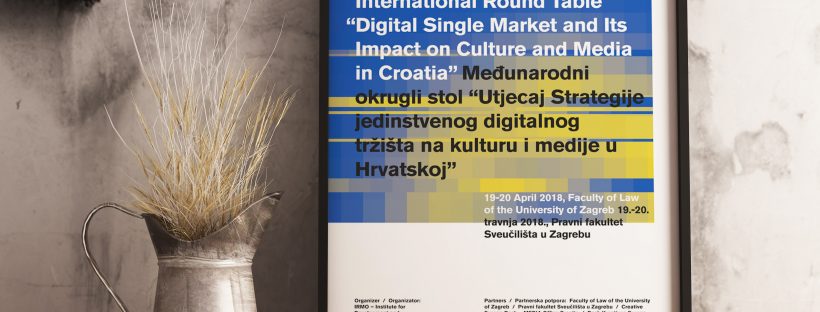IRMO has the pleasure of announcing Professor Katharine Sarikakis’ introductory keynote lecture to its International Round Table ‘Digital Single Market and Its Impact on Culture and Media in Croatia’, to be held on 20 April 2018 under the title ‘’Culture and the (New) Single Market: Reproducing Regimes of Dominance or Rebooting the New Europe?’’.
Save the date and do not miss this special opportunity to hear Professor Sarikakis from the Department of Communication, University of Vienna speaking about the challenges posed by the Digital Single Market framework!
The lecture will take place at the Council Room of the Faculty of Law, University of Zagreb on 20 April 2018 at 10:00 a.m. Please register early, as places are limited by the capacity of the venue (seating maximum 80 persons), and no later than 15 April via the provided registration form.
Culture and the (New) Single Market: Reproducing Regimes of Dominance or Rebooting the New Europe?
Katharine Sarikakis
Despite the fact that European integration has been largely associated with ’hard’ areas of policy, such as fiscal, agricultural and technological, the substance of integration has been tested on all things ’soft’: from the experience of citizens of Europe as a polity to the learning about one’s neighbours and the expression of the range of possibilities of what it means to be European in everyday life. The levels of trust and distrust in European institutions, the future of Europe and the place identity has always been tested in the ways of life, beliefs and expressions carried through what we call ‚culture‘. More so, historically, the success of the European project has been reflected by the degrees of attention it has given to the cultural ’sector‘, from the high arts and the media to the protection of free speech. The European polity has, however, an ambivalent relation with culture: it has fragmented it, monetized, instrumentalized, glorified, economized, promoted, marginalized, reimagined it through policies which, in regulatory terms, have treated various aspects of culture in different and even conflicting ways.
The most recent challenges are those posed by the Digital Single Market framework, whereby the redefinition of the EU as a digital-oriented, single market of a Europe of 27 (or other, depending on exits of, accessions by and restrictions on) states, effectively reproduces and insists on the perpetuation of unequal motors for development in the sector. Critics worry that cultures and the cultural sector, in particular in small nations, or, more precisely, in countries other than the big four (France, Germany, Spain, UK) and the dominant two (Germany and UK), would be subsumed in a regime of dependence and tokenism, rather than in a state of development and flourishing.
The questions are many and urgent, particularly given the fact that Europe is not confronted with the ’normal’ challenges of skepticism of the European Single Market of 1992, but rather with the extreme consequences of multiple polarizations in the political, financial and social realities in people’s lives. Within this context, the burden on European states is heavier than before: the old tools of inward-gazing cultural policies may have exhausted their capacity. The way forward is quite arguably the creation of more integration, however one that meaningfully and engagingly connects national sectors, national markets, national audiences and national makers along axes with a political purpose: to protect, promote, reinvigorate and reboot democracy. Smaller, multiple, networked ’Europes‘ through coordinated action can steer the DSM to the desired destinations of multiple voices though paying attention to other pieces of the puzzle, such as the institutions of public service media, the institutions of archives and heritage, non-professional culture actors, the youth and the educational system.
For further information, please follow CULPOL project or contact us via e-mail at culpol@irmo.hr

